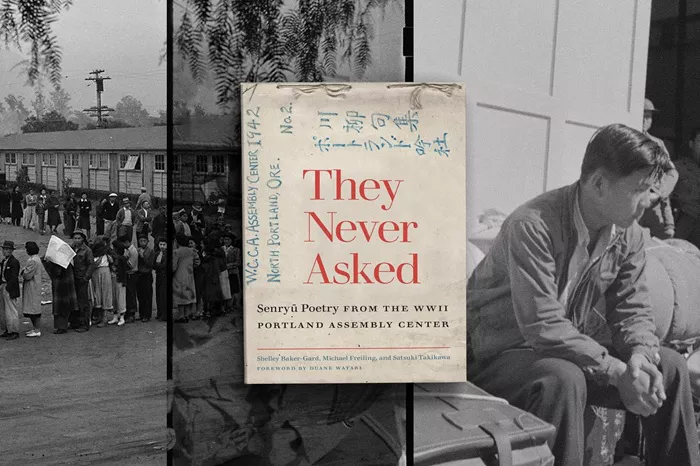A newly translated collection of Japanese poetry written by an immigrant couple incarcerated during World War II offers a rare, first-person perspective on the forced displacement and incarceration of Japanese Americans.
Titled By the Shore of Lake Michigan, the volume compiles tanka poems written by Tomiko and Ryokuyo Matsumoto, a husband and wife who were uprooted from their Los Angeles home and grocery store in 1942. Their journey—from incarceration at the Santa Anita Assembly Center and Heart Mountain Relocation Center to their postwar resettlement in Chicago—is chronicled across 17 years of poetry.
Published by the UCLA Asian American Studies Center, the book marks the first time the poems have been made available in English. The translation was led by the couple’s granddaughter, Nancy Matsumoto, who worked on the project for nearly 15 years with the help of translators Kyoko Miyabe and Mariko Aratani.
“This work provides a deeply personal and emotional record of one of the darkest chapters in Japanese American history,” said Karen Umemoto, executive director of the UCLA Asian American Studies Center. “The poems range from lyrical to political, capturing the Matsumotos’ resilience amid unconstitutional incarceration.”
Between 1942 and 1946, more than 120,000 Japanese Americans and Japanese nationals were forcibly removed from their homes under Executive Order 9066, following the Japanese attack on Pearl Harbor. Most were relocated to internment camps across the western U.S. and Arkansas. The majority had not been charged with any crime.
While many second- and third-generation Japanese Americans have shared their wartime experiences through films, memoirs, and literature, first-generation voices—known as Issei—remain comparatively scarce. The language barrier has prevented many Issei accounts from being translated into English, making By the Shore of Lake Michigan a rare and valuable resource.
Poetry Amid Displacement
Ryokuyo Matsumoto, born in Japan’s Chiba prefecture, immigrated to Seattle in the early 20th century. He returned briefly to Japan to marry Tomiko, before the couple settled in the U.S. and eventually opened a grocery store in Los Angeles. During the family’s incarceration at Heart Mountain, Ryokuyo began writing poetry and joined the Araragi poetry society.
Tomiko, also born in Chiba in 1900, studied tanka poetry under Kashu Mainichi, former editor of the Japan-California Daily News. In 1955, a poem she wrote was selected for Utakai Hajime, an annual poetry reading hosted by Emperor Hirohito. She later became a member of the Uta to Kansho poetry society.
The couple originally published their collection in Japanese in 1960. Nancy Matsumoto’s English edition features a foreword, historical annotations, and an introductory essay by Eri Yasuhara, dean emerita of Cal State San Bernardino’s College of Arts and Letters.
An Enduring Literary Tradition
Tanka poetry, a traditional Japanese form dating back to the seventh century, consists of five lines following a 5-7-5-7-7 syllabic structure. Unlike haiku, which typically focuses on nature and seasonal themes, tanka offers greater emotional and thematic freedom, often exploring love, loss, and reflection.
For the Matsumotos, tanka became a medium for processing the trauma and upheaval of wartime displacement. One of Tomiko’s poems captures the quiet anguish of raising children in such circumstances:
Seeing my child
grown strong
and taller,
my heart aches
at this time of war
(Takumashiku / setake mo nobishi / wako mireba / waga mune itashi / senji no ima o)
Translating such verses into English posed considerable challenges, particularly due to the nuances and implicit meaning typical of Japanese language and literature. Matsumoto’s team aimed to preserve both the emotional depth and cultural context of each poem.
A Timely Reminder
The themes explored in By the Shore of Lake Michigan resonate beyond the historical moment it documents. In recent months, the U.S. government has invoked the Alien Enemies Act—originally used to justify Japanese incarceration during WWII—to deport individuals suspected of gang affiliation without due process. For Umemoto, the Matsumotos’ poems are a poignant reminder of the consequences of unchecked state power and racial profiling.
“This collection is not just a historical document,” Umemoto said. “It’s a testament to the enduring human spirit and the importance of bearing witness—especially through art.”

